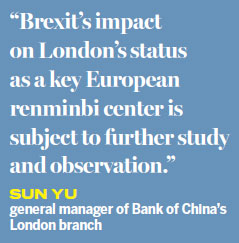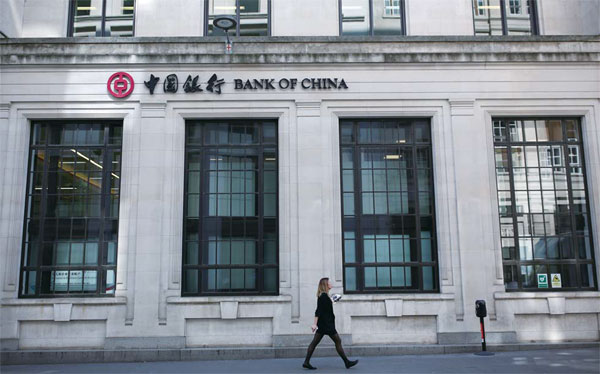London's RMB center role to be under close scrutiny
Updated: 2016-07-02 06:56
By Cecily Liu in London(China Daily Europe)
|
|||||||||
Brexit may usher in new start for UK's financial hub as it targets greater trades in the Chinese currency
Brexit's impact on London's status as a key European renminbi center is subject to further study and observation, analysts say, as financial institutions keep a close eye on Britain's upcoming negotiations with the European Union.
"Brexit's impact on London's status as a key European renminbi center is subject to further study and observation. The British capital is positioned as a leading offshore RMB center for many reasons, not just because Britain is a part of the EU," says Sun Yu, general manager of Bank of China's London branch.
|
A woman walks past the Bank of China in the City of London. Dan Kitwood / Getty Images |
"After the UK leaves the EU it also wants to embrace the world, and one of the key strengths of London's financial center is its high level of internationalization. The RMB is a newcomer to the global financial market, and the UK's financial center is creating a new start for itself after Brexit. So I think London's desire to embrace renminbi activities will increase."
Offshore renminbi activities in London have increased rapidly in recent years. One key milestone came in April when London overtook Singapore to become the second-largest offshore RMB clearing center, according to data from Swift, the global payments system.
The latest Swift data shows Britain accounts for 6.3 percent of all offshore transactions using RMB compared with Singapore's 4.6 percent. Hong Kong is still the largest offshore market, processing 72.5 percent of all renminbi payments.

In June, China's Ministry of Finance issued a 3 billion yuan ($451 million; 409 million euros), three-year sovereign bond in London, the first to be issued outside China.
Sun says one key reason for London's strength in offshore RMB activity is down to the Chinese currency's internationalization entering a new stage of development, "from its previous trade financing currency to increasingly being an international trading and investment currency".
"As London is an important financial hub, it can facilitate more trading and investment activities and products to accommodate the RMB's increasing use as a trading and investment currency," he says.
Sun adds that although his team had not expected Britain to vote to leave the EU, Bank of China, like many other financial institutions, had prepared contingency plans for the outcome.
"In the financial world, we can't ignore tail risks (those resulting from unforeseen events that can have large financial consequences). So we've prepared contingency plans at the group level."
So far, management of liquidity and currency exchange risks, as well as Bank of China's financial products and services, have been running smoothly, he says, adding that the relative stability of the RMB following the Brexit vote demonstrated international investors' confidence in the Chinese economy.
"Generally, when such 'black swan' events happen, you have a tendency to get rid of high-risk currencies, which tend to be emerging economies' currencies. The fact the RMB experienced little volatility on June 24 distinguished it from other emerging-market currencies."

Black swan events, popularized by former Wall Street trader Nassim Nicholas Taleb, are those that come as a surprise.
The pound was down against all major world currencies on June 24, and at the end of London trading that day it was down by nearly 9 percent against the US dollar, making this one of the biggest one-day declines on record. In comparison, on the same day, offshore RMB dropped just 0.8 percent against the dollar, while onshore RMB weakened by 0.5 percent against the dollar.
Robert Minikin, head of Asia foreign exchange strategy at Standard Chartered, adds that London's RMB-related cross-border foreign exchange trade flows are unlikely to be changed by the vote, because Europe currently places few restrictions on these types of activities for cross-border capital flows with non-EU entities.
For example, European investors can readily trade foreign exchange with counterparts in Hong Kong and New York with few restrictions, so London will be no different should Britain leave the EU.
However, Brexit may affect the distribution of some London-domiciled, RMB-denominated products, such as mutual funds, to European investors. London financial organizations are currently allowed to distribute products into the EU's retail investment sector through EU passport regulations, and this privilege could be lost if Britain leaves the bloc.
cecily.liu@chinadaily.com.cn
(China Daily European Weekly 07/02/2016 page8)
Today's Top News
UKIP leader Farage says will step down
Bangladesh pays state tribute to Dhaka attack victims
Rome shows off cleaned up Colosseum
Thousands march against Brexit in London
China-UK ties to remain strong despite Brexit: envoy
Gove denies treachery as he pitches to be next PM
Theresa May among British PM hopefuls
Boris Johnson quits party leadership contest
Hot Topics
Lunar probe , China growth forecasts, Emission rules get tougher, China seen through 'colored lens', International board,
Editor's Picks

|

|

|

|

|

|








